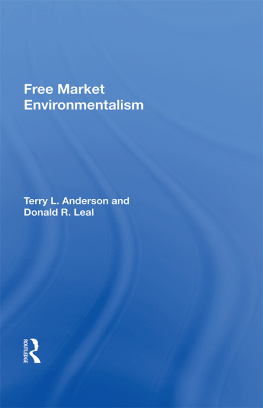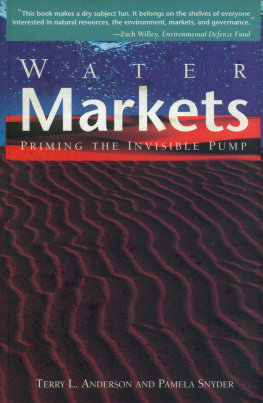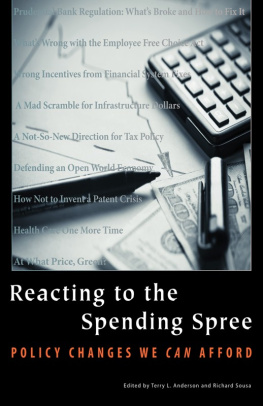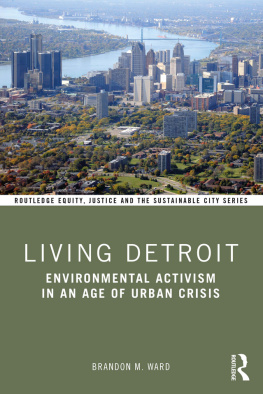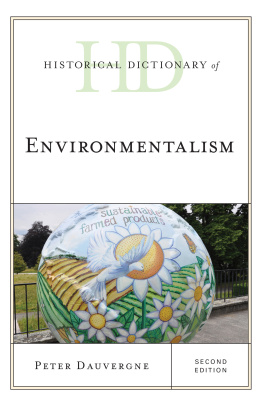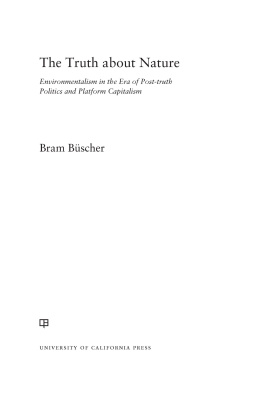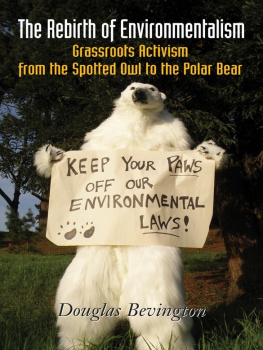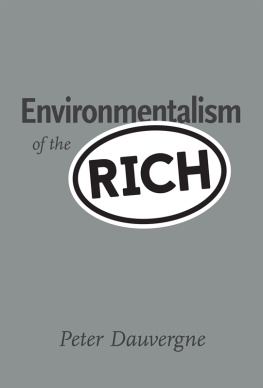Free Market Environmentalism
First published 1991 by Westview Press
Published 2018 by Routledge
52 Vanderbilt Avenue, New York, NY 10017
2 Park Square, Milton Park, Abingdon, Oxon OX14 4RN
Routledge is an imprint of the Taylor & Francis Group, an informa business
Copyright 1991 by Pacifie Research Institute for Public Policy
All rights reserved. No part of this book may be reprinted or reproduced or utilised in any form or by any electronic, mechanical, or other means, now known or hereafter invented, including photocopying and recording, or in any information storage or retrieval system, without permission in writing from the publishers.
Notice:
Product or corporate names may be trademarks or registered trademarks, and are used only for identification and explanation without intent to infringe.
Library of Congress Cataloging-in-Publication Data
Anderson, Terry Lee, 1946-
Free market environmentalism / Terry L. Anderson and Donald R.
Leal.
p. cm.
Includes bibliographical references and index.
ISBN 0-8133-11O1-2. ISBN 0-936488-33-6 (pbk.).
1. Environmental policyUnited States. 2. Free enterprise
United States. 3. Natural resourcesUnited StatesManagement.
I. Leal, Donald. II. Title.
HC11O.E5A6665 1991
333. 70973-dc20
90-48035
CIP
ISBN 13: 978-0-367-01312-7 (hbk)
Contents
Visions of the Environment
Rethinking the Way We Think
From Free Grass to Fences
From Barbed Wire to Red Tape/with Timothy Iijima
Bureaucracy Versus Environment
Inside Our Outdoor Policy
Ecology and Energy: Prospecting for Harmony
Going with the Flow: Expanding Water Markets
Homesteading the Oceans
Marketing Garbage: The Solution to Pollution
Tackling the Tougher Problems
Guide
When the Political Economy Research Center (PERC) was established ten years ago, none of us could have foreseen the extent to which free market environmentalism would become commonplace in policy debates. Originally, these ideas were on the fringes of the debate, but today the role of markets in the environment is increasingly accepted as the solution rather than the problem. This acceptance is greatest in the areas where research at PERC has developed the theory and examples of free market environmentalism.
Throughout the writing of this book, several people have been patient enough to provide very useful comments. We are especially indebted to our colleagues, Michael D. Copeland, Jane S. Shaw, and Richard L. Stroup, for their comments and suggestions. The chapters on water and recreation were originally reviewed by people at the Cato Institute and the Reason Foundation and have been revised from papers those two groups supported. Michael Greve was the first person to provide systematic comments on the entire manuscript. He forced us to tighten our arguments and improve our style. Rodney Hide of Lincoln University, New Zealand, provided inspiration and insight while Terry Anderson was a Fulbright Fellow there. In the later stages of production, Brent Haglund, Del Gardner, and Chip Mellor were of considerable help. All will find the manuscript much easier to read and much clearer because of the editorial assistance from Marianne Keddington.
Several people at PERC and the Pacific Research Institute (PRI) deserve credit for bringing this project to fruition. Monica Lane Guenther at PERC did her usual good job of coordinating budgets and conferences relating to the project and providing editorial comments. Dianna Rienhart .
Projects like this always require financial support from people and institutions who are willing to take a risk. In addition to funding from PERC and PRI, The Earhart Foundation, The Sarah Scaife Foundation, The Liberty Fund, and The M. J. Murdock Charitable Trust supported the project at various stages of production.
Free market environmentalism is in its infancy compared to centralized approaches to environmental problems. Therefore, we hope this book stimulates environmental entrepreneurs to discover more innovative ways of promoting environmental quality while enhancing economic productivity. With such entrepreneurship, future generations will be left with an improved stock of physical, human, and environmental capital.
Terry L. Anderson and Donald R. Leal Political Economy Research Center
Visions of the Environment
Many people see free markets and the environment as incompatible; for them, the very notion of free market environmentalism is an oxymoron. Even many free marketeers find themselves on opposite sides of the fence when it comes to governmental regulation of the environment. Some will hold fast to the conviction that markets work best to allocate most of the goods and services we enjoy, but they will also argue that the environment is different and is too precious to be allocated on the basis of profits.
The view that markets and the environment do not mix is buttressed by the perception that resource exploitation and environmental degradation are inextricably linked to economic growth. This view, which first emerged with industrialization, builds on fears that we are running out of resources because economic growth based on materialistic values is tempting us to squander our natural endowment. During the Industrial Revolution in England, the Reverend Thomas Malthus articulated this view by hypothesizing that exponential population growth would eventually result in famine and pestilence; productivity simply would not be able to keep up with population. The human propensity to reproduce, according to Malthus, would eventually surpass our ability to feed ourselves.
Modern-day Malthusians have given such dire predictions an aura of credibility by using complex computer models to predict precisely when Malthusian calamities will occur. In early 1974, a group of scientists from the Massachusetts Institute of Technology predicted:
If the present growth trends in world population, industrialization, pollution, food production, and resource depletion continue unchanged, the limits to growth on this planet will be reached sometime within the next one hundred years. The most probable result will be a rather sudden and uncontrollable decline in both population and industrial capacity.
In a graph generated by its computer model, the scientific team showed that the uncontrollable decline would begin shortly after the turn of the centuryin 2005, to be exactwith a precipitous decline in industrial output, food supplies, and population.
The Global 2000 Report commissioned by President Jimmy Carter arrived at similar conclusions in its prediction of what the state of the worlds population and natural resources would be at the turn of the next century. If present trends continue, the report claimed, the world in 2000 will be more crowded, more polluted, less stable ecologically, and more vulnerable to disruption than the world we live in now. Serious stresses involving population, resources, and environment are clearly visible ahead. In every resource category, Global 2000 predicted overuse and declines in quantity and quality.
But there is no indication that these predictions will come to pass, and many of them have already been proven wrong.
Neo-Malthusians might agree with Simon about the value of the human mind, but they generally see political controls of resource use as the only way to implement this human ingenuity. If markets that promote resource consumption are the cause of the problem, then government must be the solution. When nineteenth-century timber harvests denuded portions of the upper Midwest, there was a call to nationalize the forests to ensure against predicted timber famines. Although there has been no timber famine and private forests continue to be more productive than public forests, the political response has endured. From land to water to air, governmental controlwhich means political controlis seen as a necessary check on the environmental ravages of free markets.

